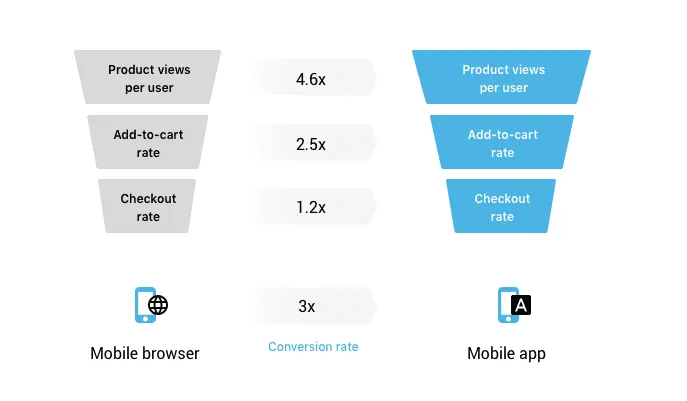How a Mobile App Can Transform Your Business Strategy-[BranexAE]
Everything is available with just a tap! Whether you need to order food, do shopping, or make seamless payments through online banking, you’re all sorted.
Mobile apps have reshaped how we live and interact with businesses.
For companies or established enterprises, this shift is not just a trend. It’s a wake-up call. A mobile app has become a strategic necessity that impacts customer engagement, data-driven decisions, operations, and revenue.
Let’s explore how a mobile app can transform your business strategy, highlight industry examples, share cost & ROI insights, and explain why choosing the right mobile app development company is critical to long-term success.
The Shift to Mobile-First Business Models
We have officially entered the mobile first era.
And no, it’s not about building a mobile friendly website but a seamless mobile app. Gone are the days when smartphones were used only for communication. It goes beyond that. You can see every individual using it to make payments, send emails, and attend meetings all with a smartphone. Smartphones are entertainment hubs and productivity assistants in our pockets. But for business owners, it’s an opportunity they can leverage.
Let’s consider a graphic representation of how building a mobile app can 3x your conversion rate.
This shows why businesses are moving to mobile-first strategies. Furthermore, there are some other factors too that are compelling business owners to shift towards mobile first approach.
- Customer Expectations: Customers demand convenience. Whether it’s booking a ride, ordering food, or paying bills, they expect these services to be accessible within a few taps. Businesses that fail to meet this expectation risk being seen as outdated.
- Digital Competition: In industries like retail, hospitality, or healthcare, mobile-first competitors dominate. A website alone is no longer enough; customers want the speed and personalization apps provide.
- Market Opportunity: In Dubai, smartphone penetration exceeds 90%, making it one of the most mobile-savvy markets in the world. Companies that don’t invest in apps risk losing customers to rivals who already have.
A mobile app development service bridges this gap by helping businesses to stay accessible, competitive, and aligned with modern consumer behavior.
5 Ways Mobile Apps Is Transforming Your Business Strategy
1. Enhanced Customer Engagement
Apps provide a direct communication channel with customers, something websites and social media can’t fully achieve. Here’s how:
- Push Notifications: Businesses can send timely reminders, flash sales, or personalized recommendations directly to users’ phones. This keeps your brand top-of-mind and drives instant action.
- Loyalty Programs: Apps can host reward systems where customers earn points for purchases and redeem them for discounts. This gamification creates stronger emotional ties with your brand.
- In-App Messaging: Features like live chat or AI chatbots allow customers to ask questions instantly, boosting satisfaction and reducing drop-offs.
2. Data-Driven Decision Making
In the digital age, data is the new currency. Apps allow businesses to collect and analyze insights that were once difficult to capture:
- Customer Preferences: By tracking user behavior like most-searched items, time spent on certain sections, or abandoned carts, you can easily understand what customers really want.
- Purchase Trends: Businesses can analyze peak buying times and align campaigns accordingly. For instance, if users shop most on weekends, push exclusive weekend deals.
- Feature Feedback: Track which features are most used. If a majority uses your in-app booking feature, you can enhance it further and allocate resources wisely.
Amazon analyzes millions of data points from its app to suggest personalized recommendations, which contribute to nearly 35% of its total sales.
This is why working with a mobile app development company pays off; they don’t just build apps; they integrate analytics tools that turn raw data into actionable business insights.
3. Boosting Brand Visibility & Recognition
A mobile app isn’t just software; it’s a brand ambassador that is on your customer’s phone. With a mobile app, it’s easy to build your brand visibility. Here’s how.
- Consistent Branding: Every design choice in your app reflects your brand. From colors, to fonts, and icons. A sleek, intuitive, and consistent design builds trust and familiarity.
- Digital Real Estate: Make sure your app shows up in stores like Google Play or Apple’s App Store means millions of users can discover your brand. Each download is a new opportunity for growth.
- Professional Credibility: In competitive markets like Dubai, having an app signals professionalism. Customers often equate apps with established, reliable businesses.
4. Streamlined Business Operations
Apps aren’t just customer-facing, they can revolutionize internal workflows, too. Here’s how apps empower businesses to streamline their operations.
- Inventory Management: Retailers can build apps to track stock levels in real time, reducing overstocking or shortages.
- Employee Scheduling: Hospitality businesses can use apps to manage shifts, leave requests, and communication, ensuring smoother operations.
- Task Tracking: Service industries can develop apps that let teams update project statuses instantly, improving accountability and efficiency.
Let’s take a look at how apps are more beneficial than mobile friendly websites.
This chart shows that mobile apps offer more benefits for your business. Opt for mobile app development services to create an app to boost your business visibility.
5. Revenue Growth Opportunities
Mobile apps make it easier for businesses to increase ROI. And perhaps this is the most compelling reason to invest in an app: revenue growth.
- In-App Purchases: For industries like gaming, digital courses, or SaaS, in-app purchases generate significant income.
- Subscription Models: Apps like Spotify or Netflix thrive on recurring revenue. Even SMEs can adapt this model by offering subscription-based services.
- Mobile Commerce: Shopping apps increase purchase frequency by offering one-click payments, personalized catalogs, and exclusive discounts.
- Cross-Selling & Upselling: With AI-driven personalization, apps can recommend complementary products. Example: An airline app suggesting hotel bookings alongside flights.
Industry Centric App-Driven Transformation
Let’s explore how industries are leveraging apps:
- Retail: Mobile apps are turning stores into 24/7 digital marketplace. Customers can browse personalized catalogs, apply discounts, and pay securely without visiting physical outlets.
- Healthcare: Telemedicine apps allow doctors to consult patients remotely, schedule appointments, and even send digital prescriptions. This has skyrocketed since the pandemic.
- Hospitality: Hotels like Marriott use apps for contactless check-in, room service orders, and loyalty points, enhancing guest experiences while reducing staffing costs.
- Dubai SMEs: Local gyms, cafes, and salons are adopting booking apps to streamline reservations, improve customer convenience, and stand toe-to-toe with global brands.
The Cost & ROI of Mobile App Development
Cost in Dubai
Building an app is an investment, but it comes with promising returns. Here’s a complete breakdown of mobile app development costs in Dubai.
- Basic Apps: AED 35,000 – AED 50,000 (simple booking, contact forms).
- Medium Complexity: AED 80,000 – AED 150,000 (eCommerce, payment systems, real-time chat).
- High-End: AED 200,000+ (AR/VR, AI-driven features, enterprise-grade apps).
Factors That Influence Cost
- Platform: Different platforms have different costs. You need to analyze your budget before you choose a platform for your app. You can pick iOS, Android, or both.
- Feature Set: The more advanced features (chatbots, AR/VR), the higher the cost.
- Design Complexity: Custom UI/UX adds to development time.
- Integration Needs: Payment gateways, third-party APIs, CRM systems.
ROI of Mobile Apps
Apps deliver higher ROI than websites ever could. Here’s the reason why.
- Higher retention: Customers are more likely to return when they have easy app access.
- Increased revenue: Through direct sales, subscriptions, and upselling, you can increase revenue.
- Reduced operational costs: Automating manual tasks will help you cut down the operational costs.
Choosing the Right Mobile App Development Partner
Not all apps will provide the functionality you expect. You must choose the right mobile app development company to build an app that grows your business.
Here’s what to Look For:
- Strategy-First Approach: A good partner aligns the app’s features with your business goals instead of just building code.
- UX/UI Expertise: Design matters. A clean, user-friendly app increases adoption and retention.
- Industry Experience: Check if the company has developed apps in your sector—retail, healthcare, hospitality, etc.
- Post-Launch Support: Apps require updates, bug fixes, and feature improvements. Ongoing support is critical.
Many Dubai businesses choose local mobile app development services because they understand regional market needs, like payment preferences and language localization.
Future-Proofing with Mobile Apps
Mobile technology evolves rapidly. Apps developed today should be adaptable for tomorrow. Here are some trends shaping the future:
- AI Integration: Apps that predict user preferences and deliver hyper-personalized experiences.
- AR/VR: Retailers offering virtual try-ons or immersive shopping experiences.
- Blockchain Security: Ensuring safe and transparent financial transactions.
- Wearables & IoT: Apps integrating with smart devices for fitness, home automation, or healthcare.
Looking for a reliable mobile app development service ensures your app is built on scalable frameworks that can handle future innovations.
Bottom Line
In 2025, mobile apps are no longer optional; they’re a strategic powerhouse.
From improving customer engagement and boosting revenue to streamlining operations and enabling smarter decision-making, apps can reshape your business strategy in powerful ways.
The key lies in choosing the right mobile app development company, one that offers not just technical skills but also strategic insights. By investing in professional mobile app development services, you can position yourself to compete, grow, and thrive in the mobile-first era.
So, if you’re ready to transform your business, the time to switch to a mobile app is now.






